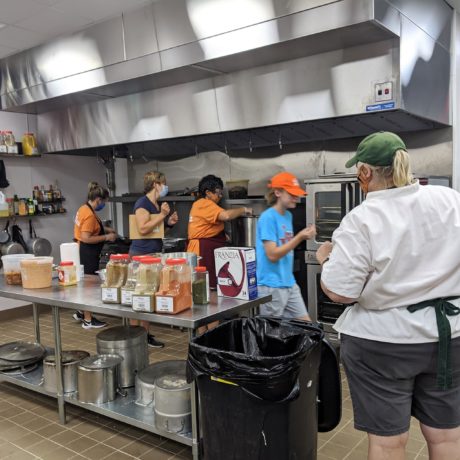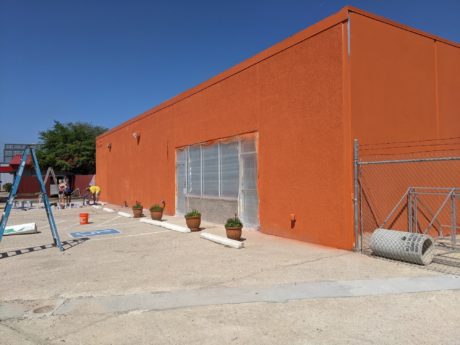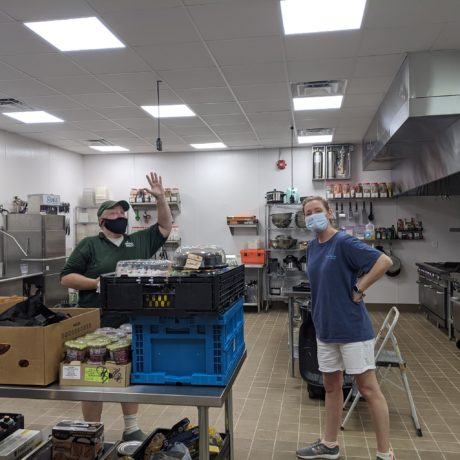
The Abundant Harvest Food Truck began as a ministry of St. Isidore’s Episcopal Church in The Woodlands, just six months before Hurricane Harvey hit the Houston area. It became the perfect ministry for the disaster because the outreach was able to meet people where they were in their communities. The mission was to feed everyone in need and do a little bit of everything to meet the needs of communities in Montgomery County.
One of the strengths of the food truck is how it gathers people together. But during COVID-19, that’s not something that can be done right now. However, similar to after Hurricane Harvey, Abundant Harvest has had to change gears and become a food distribution site and mega kitchen. Just six days before the first COVID-19 shutdown and stay-at-home orders, Abundant Harvest got occupancy of a new building.
The building has a full commercial kitchen, a 4,000 square-foot warehouse, and about 3,000 square feet of unfinished space. Abundant Harvest has moved from gathering people to primarily distributing about 35,000 pounds of food to more than 500 families per week.

The new building serves as the hub and is open twice a week for families to receive food pantry items and a hot meal. But the effort is more than just offering good. Abundant Harvest wants to acknowledge that people are not just another number. To demonstrate this, the ministry works to collect more information on each family than necessary and is intentional about building relationships and trust with the families.
Prior to COVID-19, Abundant Harvest focused on using the food truck to serve communities in two food deserts and a senior-living facility.
In the two food desert areas – King’s Colony area of New Caney and Needham Road – Abundant Harvest “set up shop” in the middle of the block and families were able to drive by to pick up food and other basic needs items. For Tamerac Pines, the income-restricted senior community, the ministry dropped off food to the door of each senior.
This relationship building continues to be an important aspect of the work they are doing in the community.
“One thing that really paid off from participating in Holy Currencies, is the thought of making community partners,” said Molly Carr, the Executive Chef at Abundant Harvest Kitchen. “We have really pushed for that. We learned that lesson really well in Harvey and how important that is, and so we’ve continued that so when this disaster hit we were set up well.”
EHF’s Holy Currencies Ministry Incubation Program led Abundant Harvest to focus on building a target community and focusing there, rather than spreading over many communities. It also reinforced that building lasting relationships allows for an increase in overall wellness of the community.
Carr expressed how fortunate the ministry has been to have really good community support. Abundant Harvest is one of the few food sites in Montgomery County that has not had to close their doors due to lack of volunteers.
In addition to volunteers, Abundant Harvest has formed diverse local, state-wide, and even nationwide partnerships.
“We initially got a National Guard unit assigned to us,” Carr said. “The National Charity League and the National Charity Roundtable have also helped out with service. Various churches have partnered to volunteer in food drives or financially or sending volunteers to be able to help because the volunteer criteria changed, given the COVID crisis. Working with a youth led initiative of service, with a couple of the high schools and Interact which is a part of Rotary Club.”
On this journey, the support of the St. Isidore’s vestry, the Bishop’s Committee, and the vicar has been key to be able to adapt to changing ministry needs as they continue this mission.
Other key lessons came from the work during Hurricane Harvey.
“We need to continue to set ourselves up to be able to pivot quickly when something happens and we can’t be entrenched in what we think we are going to do so much that something happens and we can’t pivot to handle it,” Carr said. “We need to give ourselves the grace to know that it’s not going to be as good as we thought it was going to be when we were planning this dream and we have to completely shift. Everything will be okay because it is what we are being called to do.”
For other congregations exploring ministries to address community needs during the COVID-19 pandemic, or any other crisis, Carr suggests identifying people who are already doing the work in the community and forming a partnership. These partnerships tend to help both organizations grow.
“Find someone who’s already doing the work in the community, someone who is known,” said Carr. “Ask how you can help them further their mission and be in that supportive role so that when times come like this, or like Harvey, you are both strong. You will know and trust each other. Even in the midst of a crisis, it is an okay thing to do, to partner and support organizations with common goals.”
The next steps for Abundant Harvest are a real unknown. The COVID-19 pandemic is not going away any time soon and there is still a great need, particularly with food insecurity. The latest government data says there will be a 40% increase in food insecurity in Montgomery County within the year and this is something Abundant Harvest is considering.
“Our goal looking forward is how can we continue to serve the community and also be sustainable,” said Carr. “What can we do to have the revenue sources that will come in and how can we continue to be a sanctuary and safe place to provide resources for members of our community?”

Abundant Harvest, from food truck to kitchen, is a stellar example of what it looks like to leverage assets and relationships to address community need in times of crisis. Church ministries must learn to remain flexible and be willing to step into the power of the shift, when necessary, to address need and continue the work to serve the community.